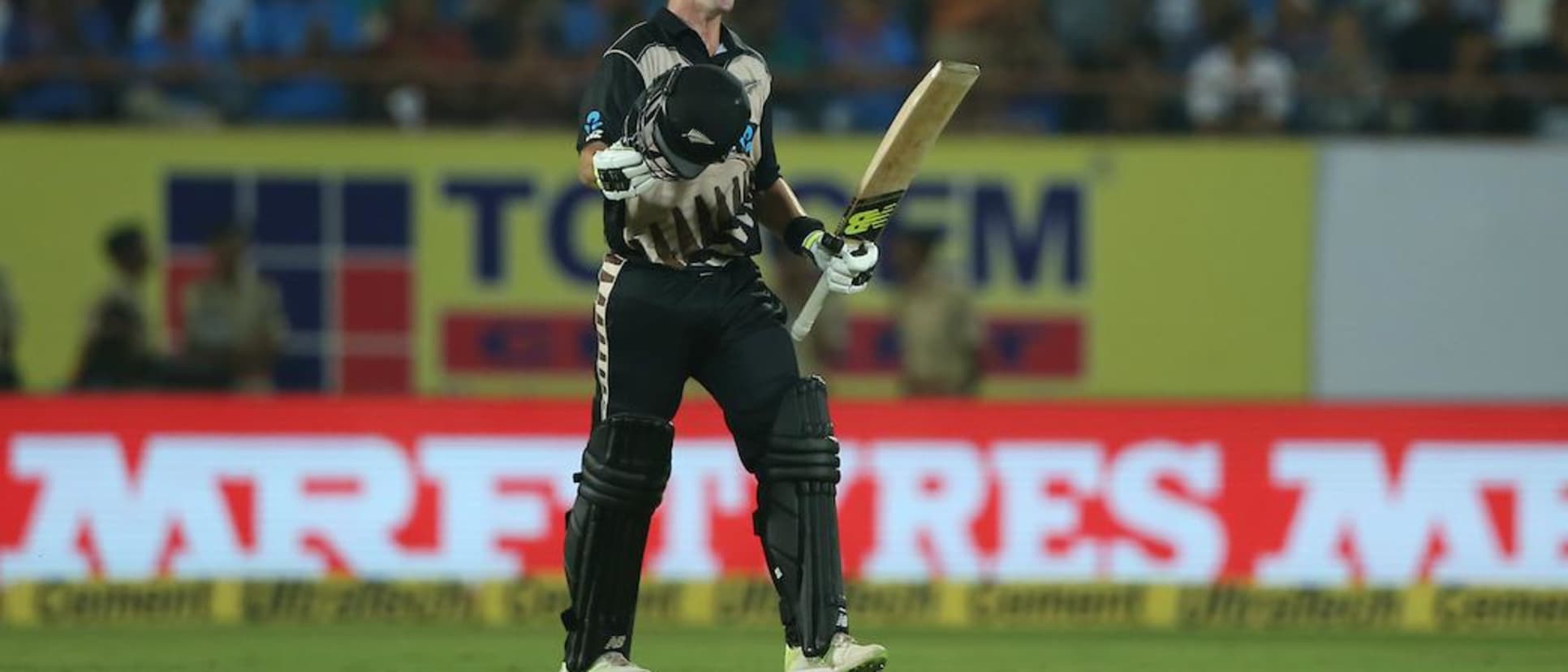
Brendon McCullum, the former New Zealand skipper, has been a firm advocate of Colin Munro’s hitting prowess at the top of the order, even taking to Twitter recently to voice his sentiment. Munro, who has predominantly played at No. 3 and below for New Zealand in the limited-overs format, was promoted to open the batting with Martin Guptill ahead of the first One-Day International in Mumbai in place of Tom Latham, who moved down to strengthen the middle order.
Munro was undone by a Bhuvneshwar Kumar yorker in the first Twenty20 International in Delhi, but more than made up for it in the second T20I, smacking a 58-ball unbeaten 109 scorching the Indian bowlers all around the field in a stunning display of power hitting at the Saurashtra Cricket Association Stadium on Saturday (November 4) to help New Zealand score a mammoth 196 for 2 in its first innings. In the process, he also became the only batsman to score two T20I hundreds in the same calendar year, after his century against Bangladesh in January 2017 at Mount Maunganui.
For his sizzling century, @manuz05 wins Player of the Match for the 2nd #INDvNZ T20I.
— ICC (@ICC) November 4, 2017
SCORECARD: https://t.co/FiTpgLPDyU pic.twitter.com/wAGfB6MPot
Munro’s fondness of the shorter formats of the game is evident from the fact that he has played 34 T20Is and 27 ODIs, in contrast to a solitary Test way back in 2013.
“I enjoy Twenty20,” said Munro after his swashbuckling knock. “It’s a game where you know it’s a short game and you go out there to express yourself and when it comes off, it comes off. Sometimes you put too much pressure on yourself in the longer form where you’ve got to score runs all the time.
“In Twenty20, you just got to go out there and express yourself and take the good with the bad. Sometimes it comes off like it did tonight and the other night it didn’t come off. You just got to go with the flow.
“It’s one of those games where when you’re going well, you’re going really well. And when you’re not, you’re not. For me it’s a mindset thing. I’ve tried not to expect too much off myself playing at this level or at Twenty20. It’s just trying to ride that wave and not trying to get caught in… when I score runs, I try not to get too high and when I don’t, not get too low. It’s just about trying to keep as even as you can and I think I’ve done that over the last two years.”
Munro was also effusive in praise of Guptill, his opening partner, for helping him ease into his new role by taking the strike first up and helping him assess the conditions better.
“I think Guppy had a lot of the strike early and he got off to a good start,” he said of Guptill, who at one stage had 12 off 18 balls. “He said the wicket was good so just play your natural game. And that helped me. Guppy facing the first couple of balls, I think that’s a tough role because the wicket could be sticky, skiddy, so he enjoys it. The communication we have at the top of the order and throughout our batting is key in order to make those big targets.”
The slower balls had brought about Munro’s downfall in the first two ODIs, at Mumbai and Pune respectively, but the southpaw guarded well against them in the second T20I, getting on top of it at every instance.
“To be honest, I wasn’t expecting too many slower balls in the first couple of ODIs,” said Munro. “Bhuvi and Bumrah just bowled back of a length, trying to nick you out, bowled or LBW. And the way I came out was aggressive and that made them change a bit. They bowled really well in terms of that. Bumrah’s slower ball … he’s made a name for himself with that slower ball and Bhuvi’s knuckle ball is very good with the new ball.”
Munro has had an indifferent year as far as the shortest format is concerned, with four single-digit figures – including three ducks – to go with the two centuries, but said a stable spot in the side has done his confidence a world of good.
“For me, the biggest part of being successful at this level is the mental side,” Munro exclaimed. “I’ve scored runs for Auckland for a long time, it’s just trying to get the same mental aptitude at this level.
“I think in the past I’ve probably put too much pressure on myself and haven’t always had that role cemented my spot in the team, so it’s always ‘what can I do to make the team’ rather than what I do now which is ‘what can I do to win a game’. Or what I can do to contribute to the game. And that’s what makes a difference. Even if it’s 20 off 10, that’s a contribution, whereas in the past I’ve been not good enough to stay in the team. But now it’s more of a mental mind-shift.”